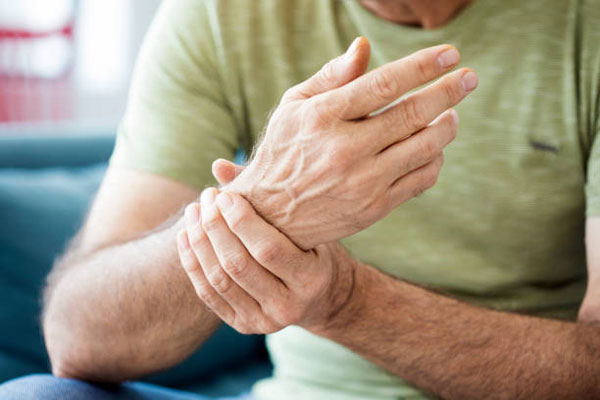Hand Arthritis
Our hands engage in many kinds of simple to highly manipulative and delicate jobs in our day-to-day lives. They are matchless in their functionality, and continuous research towards the development of bots that have similar functions is still underway.
Any small problem related to your hands may have a great impact on your daily life. If you feel any pain, tenderness, or swelling in your hands, seeking a doctor's advice is always important, as the underlying reason could be arthritis. Though it is less common in hands, if left untreated, hand arthritis may cause the joints to lose their normal shape, leading to severe pain and limitations in movement.

What are the symptoms of Hand Arthritis?
The most typical signs of arthritis are pain and stiffness. However, the symptoms vary according to the underlying condition.
Initially, you may feel a dull pain with a burning sensation. Symptoms like pain and stiffness are typical in the morning. The pain could be worse after periods of increased joint use and in cold weather. You may feel relieved while at rest. As the condition progresses, the symptoms may occur more frequently, such that you may experience constant, sharper pain with increased stiffness. In severe conditions, the joint pain may disturb your sleep.
Other symptoms may include
- Inflammation with swelling and warmth
- Unusual sensation: You may have a grating or grinding sensation in your joints as the damaged cartilages rub against each other. Unusual cracking sounds may also be experienced as your bones rub against one another.
- Lumps: Bony growths may also occur near your joints, causing pain and discomfort. The ones that appear on the middle joint of the finger are known as Bouchard's nodes, and the others that occur near the fingertip are called Heberden's nodes.
- Cysts: Arthritis, when it affects the end joints of the fingers, may also lead to the development of small fluid-filled cysts (mucus cysts). They may also lead to dents in the nail plates of the affected finger.
What are the causes of hand arthritis?
Arthritis may occur due to many reasons. Some of them include:
- Osteoarthritis: It is the most common form of arthritis caused by wear and tear of the joints.
- Rheumatoid arthritis: It arises when your body's immune system acts against own self, particularly your joints. It commonly affects your finger and wrist joints.
- Gout: Gout is a form of arthritis that occurs when a high amount of uric acid accumulates in your blood, leading to the formation and deposition of needle-shaped crystals in the tissues and joints of the body. The big toe is commonly affected; the other smaller joints may also be affected.
- Trauma: Injuries that may damage your joint surface or dislocate them always carry a future risk of making them arthritic, even if they are properly treated.
- Psoriatic arthritis: Psoriatic arthritis is a form of inflammatory arthritis that affects the joints and skin. It can cause itchy and painful patches on the skin along with symptoms like pain, swelling, and tenderness in the joints of the fingers, wrists, ankles, and knees.
How is the arthritis of the hand diagnosed?
The diagnostic approach may be as follows:
Medical history: During diagnosis, your doctor may review your medical history, including your pain history and the conditions that may worsen the symptoms. He may also try to learn about any related conditions causing arthritis that run in the family.
Physical examination: Examining your joints may help the doctor differentiate between osteoarthritis and other inflammatory conditions causing hand arthritis. The swelling may feel hard during osteoarthritis due to the occurrence of extra bone deposits near the joints (osteophytes) or soft during inflammatory diseases like rheumatoid arthritis. The physician also tries to feel any unusual creaking or grinding noise (crepitus) while moving your joint that may happen due to loss of cartilage.
Blood tests: Blood tests may be recommended to determine the presence of certain antibodies, such as anti-cyclic citrullinated peptides (anti-CCP) or rheumatoid factor, which helps in the identification of rheumatoid arthritis and other types of inflammatory arthritis.
Imaging tests: Imaging tests such as X-rays and magnetic resonance imaging (MRI) may be recommended to identify the loss of cartilage, the loss of joint space, and the formation of osteophytes (bony growths around the joints).
How is hand arthritis treated?
A number of treatment options are available to provide relief from the symptoms. The treatment regimen usually depends on the severity of the condition, age, activity levels, and personal goals.
- Medications: Certain non-steroidal anti-inflammatory drugs (NSAIDs), such as ibuprofen or naproxen, may be recommended to provide relief from pain.
- Injections: Injections such as cortisone are used to provide relief from pain for a longer period of time. However, their use is usually limited due to possible side effects such as weakening of tendons and ligaments or infection.
- Splints: Splints provide support to the affected joint and reduce the stress caused by frequent activities. However, long-term use should be avoided, as it may lead to muscle weakness and atrophy (muscle loss).
- Surgery: Surgery is considered when all the other non-surgical options fail to provide relief. The first goal of surgery is to preserve or reconstruct the joint. If this option is not applicable or if the damage is so severe that the joints will no longer work, other options are considered. They may include joint replacement, which helps provide relief and restore joint functionality, or joint fusion, which may provide relief but limit joint movement.
What is the prognosis of hand arthritis?
After treatment, the length of the recovery period varies depending on individual factors and the type or extent of the surgery. During the recovery period, a physical therapist may help you with exercises that strengthen the muscles, improve joint function, and maximize your recovery. Post-treatment, the majority of the patients are able to return to most of their desired activities.